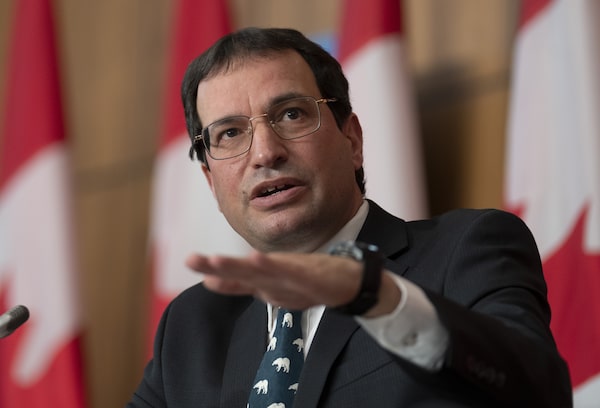
Commissioner of the Environment and Sustainable Development Jerry DeMarco during a news conference on Nov. 25, 2021 in Ottawa.Adrian Wyld/The Canadian Press
Canada’s carbon pricing system is disproportionately hard on Indigenous communities and small businesses and not hard enough on the biggest emitters, the federal environment commissioner said Tuesday in a new audit.
The carbon pricing audit was one of five published Tuesday by Jerry DeMarco. He also looked at the government’s plans for transitioning workers away from fossil fuel industries, its hydrogen energy strategy, climate-related infrastructure policies and the government’s efforts to cut its own emissions.
DeMarco says there is a “broad consensus” among experts, including the World Bank, the OECD and the International Monetary Fund, that carbon pricing is a critical tool for curbing greenhouse gas emissions.
But he says Canada’s system hasn’t done enough to ensure the carbon price is applied fairly to the biggest industrial emitters, who pay the price only on a portion of the emissions they produce in a bid to protect their competitiveness and prevent undue economic harm.
Consumers and smaller businesses pay the price – currently $50 a tonne – on all fuel purchases.
DeMarco said he is aware there are risks that if Canada’s carbon price is too high, some companies will simply move their business elsewhere. But he said Canada hasn’t done a fulsome examination of that risk.
“There’s a question of fairness between the federal large emitters program, the OBPS, as it’s called, and the carbon levy that everyday Canadians pay,” DeMarco said at a news conference.
“So we recommended that the government strengthen the large emitters approach, including its approach to approving or not approving provincial programs.”
Furthermore, he said the federal government approved provincial carbon pricing systems for big emitters that were weak and not on par with the stringency of the federal system.
Currently, eight provinces and the Northwest Territories use their own systems and DeMarco said there is little continuity of the price paid by industries across the provinces.
The price per tonne for pulp and paper companies runs from a low of $1.82 to a high of $34.04, for cement producers from 54 cents to $17.94 and for petroleum refiners from $1.55 to $32.34.
DeMarco said all provinces were supposed to apply the carbon price to the same emissions sources, but that didn’t happen. It means the share of emissions covered by carbon pricing ranges from a low of 54 per cent of all emissions in Prince Edward Island to a high of 87 per cent in Nova Scotia.
Consumers in provinces using the federal carbon pricing system get rebates from the government so they’re not disadvantaged from paying the carbon price, but because the rebate is standardized based on their family size and isn’t tied to how much fuel they use, they have an incentive to cut their fuel use because they’d get the same rebate and pay less in carbon pricing.
Canadians in rural and remote communities get a 10 per cent bonus in their rebate assuming they drive more and have higher carbon pricing costs. But DeMarco said the government hasn’t done any assessment to truly determine whether the rebates are covering their extra costs.
“We’re asking them to do that calculation, check whether it adds up and to report publicly on it,” said DeMarco.
Small businesses that pay the price on input fuels don’t get a rebate but can apply for grants from the government to make their businesses more energy efficient. But DeMarco said very little of the money assigned to that program has flowed to date, leaving small businesses paying the highest carbon price costs with little relief.
The government accepted most of the recommendations made and is vowing to follow up. Environment Minister Steven Guilbeault said the government is working to tighten up agreements with provinces on the carbon price and has moved to close some loopholes that allowed less stringent plans to pass the federal test.
“I just want to say that I and my government welcome the report from the commissioner on the environment and sustainable development,” he said. “I have followed very closely these reports for more than two decades. They are an important element, they are a key element of helping governments, not just our government, but governments improve on what they’re doing.”
In a separate audit, DeMarco said the government is both “unprepared and slow off the mark” responding to the need to help more than 170,000 fossil fuel workers prepare for a transition to a cleaner energy economy.
A “just transition,” as it is called, was part of the 2015 Paris agreement Canada signed onto, and the Liberals first promised just transition legislation in 2019. It has yet to deliver it.
DeMarco’s audit says there is no implementation plan and no monitoring or reporting system to support this transition, and a similar attempt under way for coal industry workers relied entirely on existing unemployment programs and didn’t measure the results.
“They’re just making their work harder for themselves because they’ll generate debate and discontent if they close doors without opening them at the same rate.”
For subscribers: Get exclusive political news and analysis by signing up for the Politics Briefing.